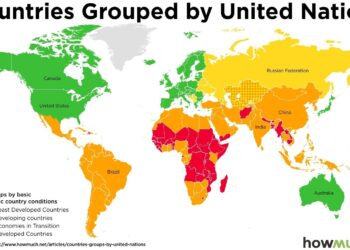In recent years, the healthcare landscape across OECD countries has undergone important scrutiny, prompting a growing focus on patient-centered care. As stakeholders look to assess the efficacy and quality of healthcare systems, the need for robust data has never been more essential. One initiative poised to reshape our understanding of healthcare outcomes is the Patient-Reported Indicator Surveys (PaRIS), which seeks to gather firsthand insights from patients themselves. In particular, Luxembourg’s findings from the PaRIS initiative offer valuable perspectives on how its healthcare system meets the needs and expectations of its citizens. This article delves into the key results and implications of the PaRIS surveys for Luxembourg, examining whether the country’s healthcare delivery truly aligns with patient experiences and aspirations. As we unpack these insights, we aim to illuminate critical challenges and opportunities for improvement, contributing to an ongoing dialog about the future of healthcare in the region and beyond.
Understanding the PaRIS Framework and Its Importance for Patient-Centered Care
The PaRIS Framework, developed by the OECD, serves as a foundational tool for evaluating and improving healthcare experiences through patient-reported indicators. By prioritizing the voice of patients, the framework shifts the focus from provider-centric metrics to understanding health outcomes from the patient’s outlook. This paradigm allows healthcare systems to identify areas of strength and opportunities for improvement, ensuring that the delivery of services is aligned with patient needs and expectations. Key aspects of the PaRIS Framework include:
- Patient-Centered Indicators: Measures that reflect the health outcomes and experiences that matter most to patients.
- Benchmarking: Comparing performance across different healthcare systems to foster learning and improvement.
- Data-Driven Decisions: Utilizing insights drawn from patient feedback to guide policy and practice.
The importance of the PaRIS Framework cannot be understated; it transforms healthcare delivery by fostering a culture that values patient feedback as critical data. Through this approach, countries can better gauge the effectiveness of their healthcare systems and develop strategies that prioritize patient satisfaction and outcomes. The framework not only aids in the assessment of existing services but also encourages innovation by highlighting successful practices from various regions. Consider the following table, which illustrates the key components essential for successful implementation of the PaRIS Framework:
| Key Component | Description |
|---|---|
| Collaboration | Engagement of stakeholders, including patients, healthcare providers, and policymakers. |
| Standardization | Ensuring consistent data collection to enable meaningful comparisons across regions. |
| Openness | Open sharing of data and results to build trust and accountability. |
| Actionability | Transforming insights into effective healthcare strategies and interventions. |
Key Findings from the Patient-Reported Indicator Surveys in Luxembourg
The latest findings from the Patient-Reported Indicator Surveys in Luxembourg provide critical insights into the patient experience and the overall effectiveness of the healthcare system. A significant portion of respondents reported feeling involved in their treatment decisions, highlighting the emphasis on patient-centered care. Key areas of interest include:
- Patient Engagement: over 75% of patients indicated they felt active participants in their health management.
- Access to data: Nearly 80% appreciated the clear interaction from healthcare providers regarding their treatment options and health status.
- Quality of care: 85% voiced satisfaction with the attentiveness and professionalism of healthcare staff.
On the other hand, areas necessitating improvement were also identified.A noteworthy percentage of respondents expressed concerns about potential waiting times for specific treatments and inconsistencies in service delivery. The survey unveiled crucial themes, including:
- Waiting Times: Approximately 30% reported dissatisfaction with the duration of wait times for specialist appointments.
- Continuity of Care: 40% of patients experienced issues related to coordination among different healthcare services.
- Accessibility: Similar percentages noted challenges in accessing certain healthcare services, notably in rural areas.
| Aspect | Percentage of satisfaction |
|---|---|
| Patient Engagement | 75% |
| Access to Information | 80% |
| Quality of Care | 85% |
| Waiting times | 70% dissatisfaction |
| Continuity of care | 40% dissatisfaction |
Assessing Patient Experiences: What Do Luxembourgers Say About Their Healthcare?
Understanding the experiences of patients is essential for enhancing healthcare quality. In Luxembourg, the OECD’s Patient-Reported Indicator Surveys (PaRIS) reveal an array of insights into how residents perceive their healthcare services. Key findings indicate that many luxembourgers appreciate the level of care they receive, yet several areas warrant attention. Common themes from patient feedback include:
- Access to Care: While most patients report good accessibility to general practitioners, specialists are often perceived as less approachable due to long waiting times.
- Quality of Interactions: Many individuals value the professionalism and empathy of healthcare providers, though a desire for more time in consultations was frequently voiced.
- Information Transparency: Patients expressed a need for clearer communication regarding treatment options and healthcare processes.
in a closer examination of specific demographics, the surveys also highlighted variations in satisfaction levels across different age groups. Younger patients generally reported higher satisfaction with healthcare technology and digital services, whereas older adults sought more personal interaction and follow-up.The data indicated a significant divide, prompting calls for customized approaches to meet diverse patient needs. The table below illustrates the satisfaction levels among various age cohorts:
| Age Group | Satisfaction Level (%) |
|---|---|
| 18-29 | 85 |
| 30-49 | 75 |
| 50-69 | 65 |
| 70+ | 58 |
Comparative Insights: Luxembourg’s Performance in the OECD Context
Luxembourg’s healthcare system has consistently demonstrated robust performance when measured against other OECD nations.A recent analysis from the Patient-Reported Indicator Surveys (PaRIS) highlights several critical areas where Luxembourg excels, offering valuable insights into patient experiences and overall healthcare effectiveness. Among these strengths are:
- Accessibility of Services: A high percentage of respondents report timely access to care,a reflection of the country’s investment in healthcare infrastructure.
- Patient Satisfaction: Luxembourg ranks favorably in patient satisfaction metrics, indicating that citizens feel their healthcare needs are being adequately met.
- Preventive Care: Emphasis on preventive health measures has facilitated early diagnosis, contributing to better health outcomes for the population.
However, as the data reveals, there are areas that still require attention to ensure continual improvement. Compared to other OECD countries, Luxembourg faces challenges, particularly in:
- Chronic Disease Management: There is room for enhancement in the integration of care for patients with chronic conditions, which can lead to more effective treatment pathways.
- mental Health Services: Although there is a growing recognition of mental health issues, access to mental health services continues to be a concern for many residents.
- Cost Transparency: Increased clarity around healthcare costs remains a pivotal goal, enabling patients to make better-informed choices regarding their care.
| Aspect | Luxembourg’s Rating | OECD Average |
|---|---|---|
| patient Satisfaction | 85% | 78% |
| Access to Care | 90% | 82% |
| Chronic Care Quality | 70% | 75% |
| Mental Health Access | 65% | 72% |
addressing Patient Concerns: Common Issues Highlighted in the Surveys
Recent patient-reported indicator surveys in Luxembourg have shed light on several recurring concerns that patients face within the healthcare system. Many respondents highlighted issues such as long wait times for appointments, lack of communication from healthcare providers, and an overall sense of dissatisfaction with the quality of care received. Specifically, patients reported that navigating the healthcare system can often feel overwhelming, with critical feedback centering on the need for more empathetic interactions and better information regarding treatment options.
Moreover, the surveys revealed that while patients are generally satisfied with the medical expertise of healthcare providers, gaps in emotional support and follow-up care persist. The following common issues emerged from the recent data:
- Long wait times: Patients expressed frustration over delays in obtaining timely appointments.
- Poor communication: Many felt that providers did not adequately explain diagnoses or treatment plans.
- Lack of emotional support: patients emphasized the need for more compassionate care and follow-up initiatives.
| Issue | Percentage of Patients Affected |
|---|---|
| Long Appointments Wait | 65% |
| Poor Communication | 50% |
| Lack of Emotional Support | 40% |
The Role of Health Policy in Responding to Patient Voices
Health policy plays a pivotal role in shaping how patient feedback is integrated into healthcare systems. By actively engaging with patient voices, policymakers can identify gaps in service delivery and prioritize areas that need improvement. Most notably, the insights gleaned from Patient-Reported Indicator Surveys (PaRIS) empower health authorities to tailor interventions that directly address patient concerns, improving their overall experience. Some of the key benefits include:
- Enhanced quality of care: Policies informed by real patient experiences lead to better healthcare outcomes.
- Increased accountability: Clear reporting mechanisms ensure that healthcare providers are held responsible for patient satisfaction.
- Targeted resource allocation: funds can be directed towards departments or services that are most in need of enhancement, as indicated by patient feedback.
Furthermore,by fostering an environment where patient voices are valued,health policy can facilitate a culture of continuous improvement. This culture not only enhances the patient experience but also fosters trust between patients and healthcare providers. The incorporation of patient feedback into decision-making processes leads to better-informed policies and practices. An illustrative depiction of this relationship can be seen in the following table:
| Patient Feedback Category | Impact on Policy | Expected Outcome |
|---|---|---|
| Access to Care | Increased funding for rural clinics | Higher patient access rates |
| Quality of Information | Mandatory training for healthcare staff | Improved patient understanding |
| Timeliness of Service | Implementation of appointment scheduling systems | reduced wait times |
Building a Culture of Continuous Improvement in Luxembourg’s Healthcare System
To foster an environment of ongoing enhancement within Luxembourg’s healthcare framework, it is indeed imperative for stakeholders to mobilize efforts around patient feedback. engaging patients through mechanisms like the Patient-Reported Indicator Surveys (PaRIS) allows healthcare providers to collect invaluable insights regarding patient experiences and outcomes. By establishing regular feedback loops, healthcare institutions can:
- Identify areas for improvement: Recognizing specific aspects of care that need attention.
- Tailor services effectively: Adjusting offerings based on what patients value most.
- Enhance accountability: Creating a culture where healthcare providers are responsible for continuous improvement.
moreover,the integration of qualitative data gathered through these surveys can illuminate not just the “what” but the “why” behind patient satisfaction scores. This deep dive into patient narratives supports a more robust understanding of healthcare quality from the patient perspective. Key areas highlighted by the PaRIS data for Luxembourg include:
| Focus Area | Patient Satisfaction Level |
|---|---|
| Access to Care | 75% |
| Coordination of Services | 68% |
| Continuity of Care | 82% |
this data not only facilitates the identification of problematic areas but also drives a culture of transparency and commitment among healthcare professionals to prioritize patient-centered care.
The Conclusion
the findings from the Patient-Reported Indicator Surveys (PaRIS) in Luxembourg provide crucial insights into the effectiveness and quality of healthcare delivery from the patients’ perspective. As the OECD continues to emphasize the importance of patient-reported outcomes in shaping health policies, these results highlight areas where the healthcare system is performing well, as well as aspects that require improvement.The engagement of patients in assessing their experiences is not just a statistical exercise; it is a vital component of a responsive and responsible healthcare system. As Luxembourg navigates the ongoing challenges in health service delivery, these insights will be instrumental in fostering a more patient-centered approach that prioritizes quality and accessibility. Policymakers, healthcare providers, and stakeholders must take heed of this data, using it as a foundation for meaningful reforms that ensure healthcare truly delivers for all citizens.













